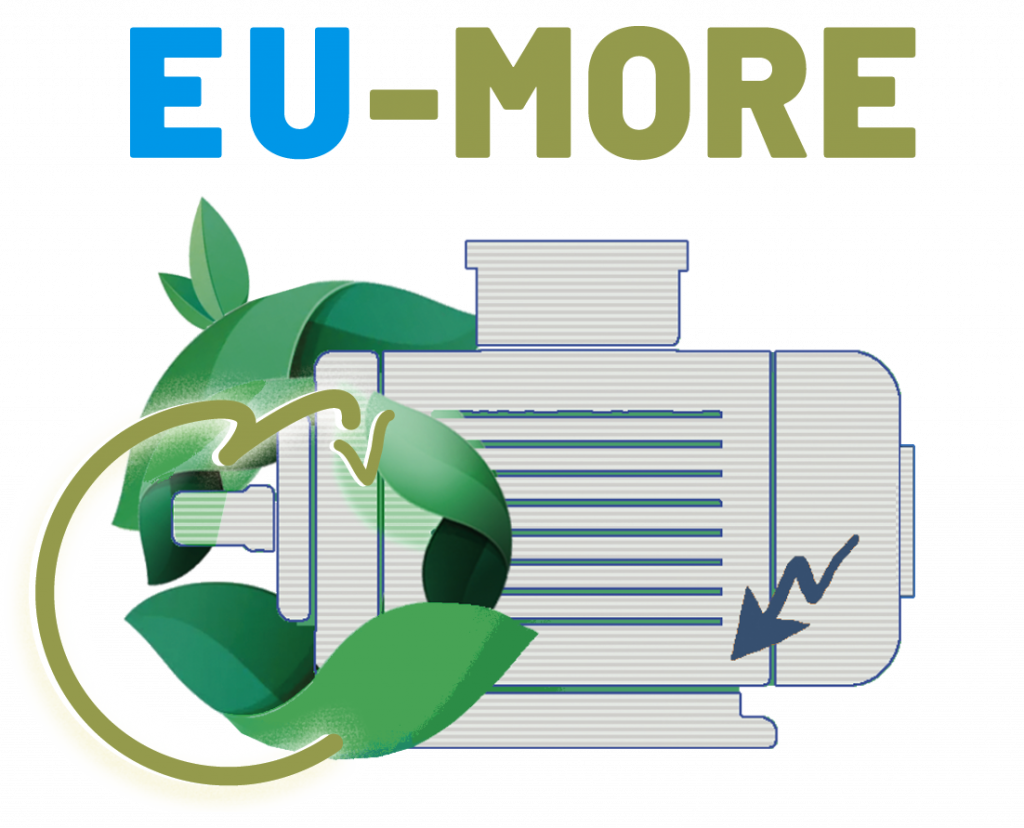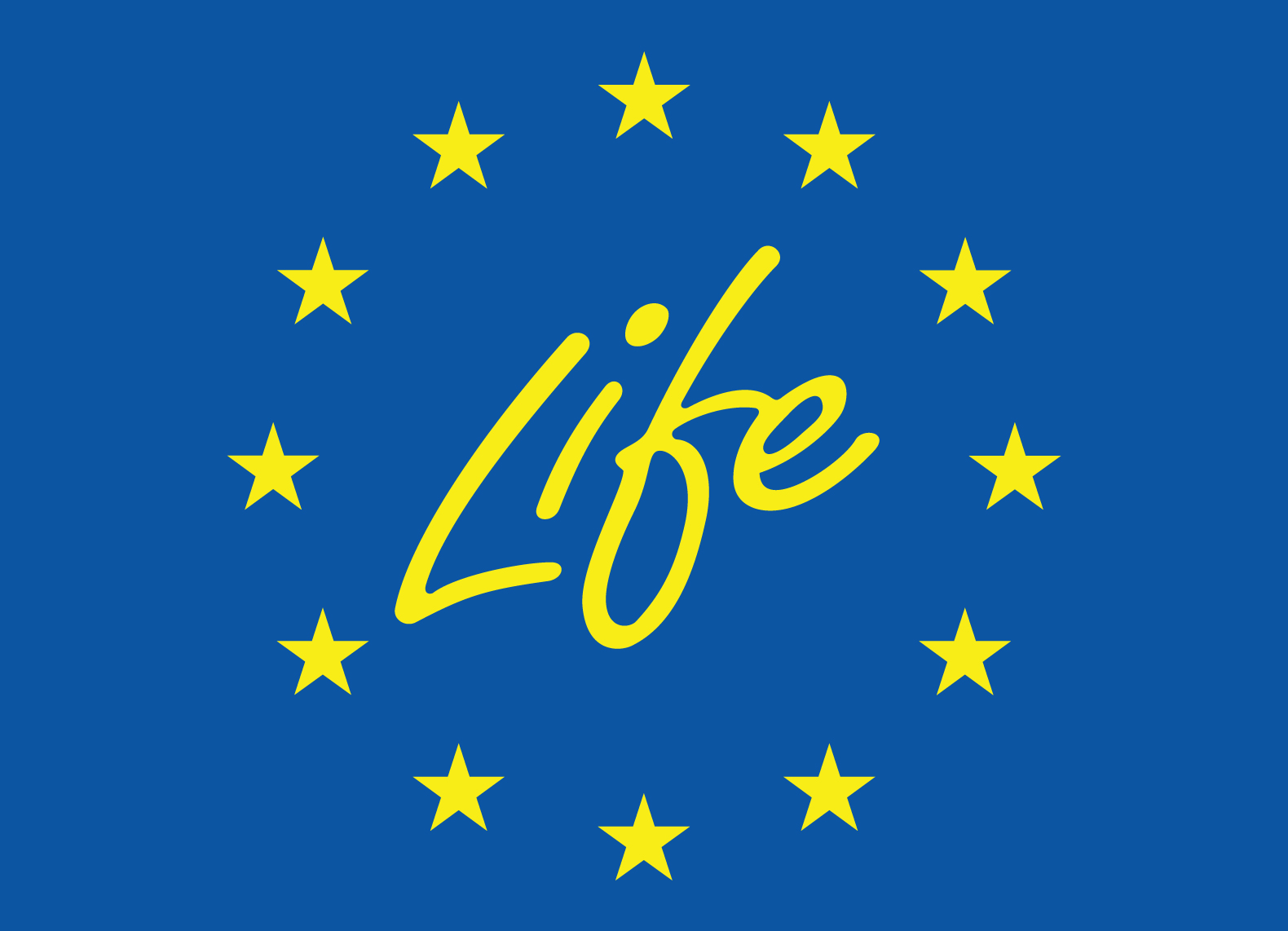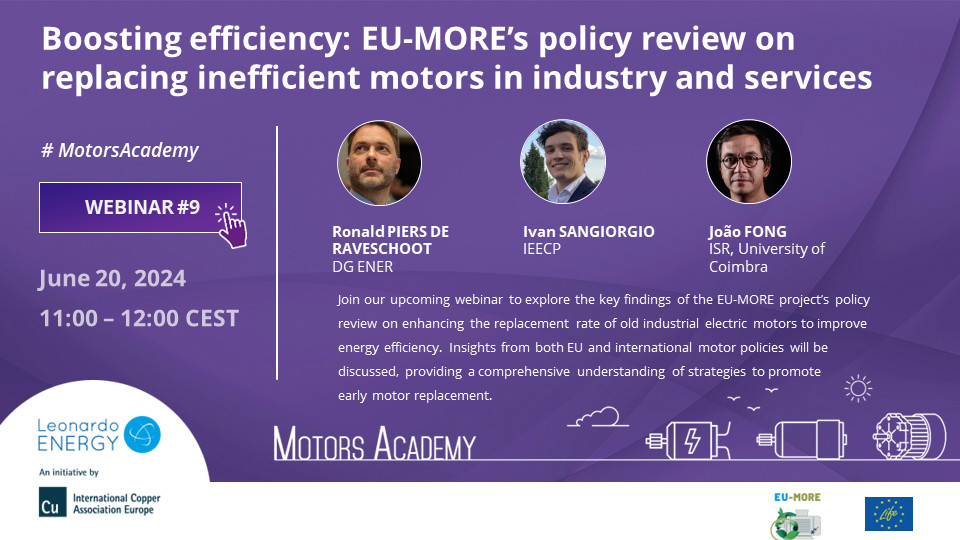
Register for our EU-MORE webinar #1: Boosting efficiency: EU-MORE’s policy review on replacing inefficient motors in industry and services
📆 20th June 2024 – online
⏰ 11:00 – 12:00 CEST
👉register here:
https://lnkd.in/eSwPP5xW
🎤 We will welcome speakers from IEECP- Ivan Sangiorgio , Universidade de Coimbra – João Fong and DG Ener – Ronald Piers de Raveschoot.
Electric motors used in industrial applications often remain in service beyond their expected lifespan, limiting the benefits of newer, more efficient motors. The EU-MORE project aims to capitalize on the advantages of accelerating the replacement rate of old, inefficient motors by developing new policies. To achieve this, a review of past and current policies affecting industrial electric motors in the 27 EU Member States was conducted. The review includes 64 policy measures aimed at promoting the early replacement of motors to improve energy efficiency in industries. Each policy measure was characterized with details such as the national responsible authority, implementation timeline, available budget, and impacts on electricity savings and replaced industrial motors.
The review process relied on contributions from various country experts who provided a high-level perspective on the national policies under examination. The results show a strong prevalence of financial measures (subsidies and loans), followed by mandatory standards, fiscal measures, and voluntary agreements. The review also highlighted a significant lack of measures targeting trainings and information, deemed particularly relevant for industrial SMEs. Few national policies are incorporating systemic approaches to motor systems, such as including the supply and demand sides of motive power.
The review is complemented by an analysis of relevant motor policies implemented outside the European Union.
After the presentation, the participants can interact with the speakers and will be able to discuss policy measures that are needed to speed up the adoption of state-of-the-art electric motors in industry and services.
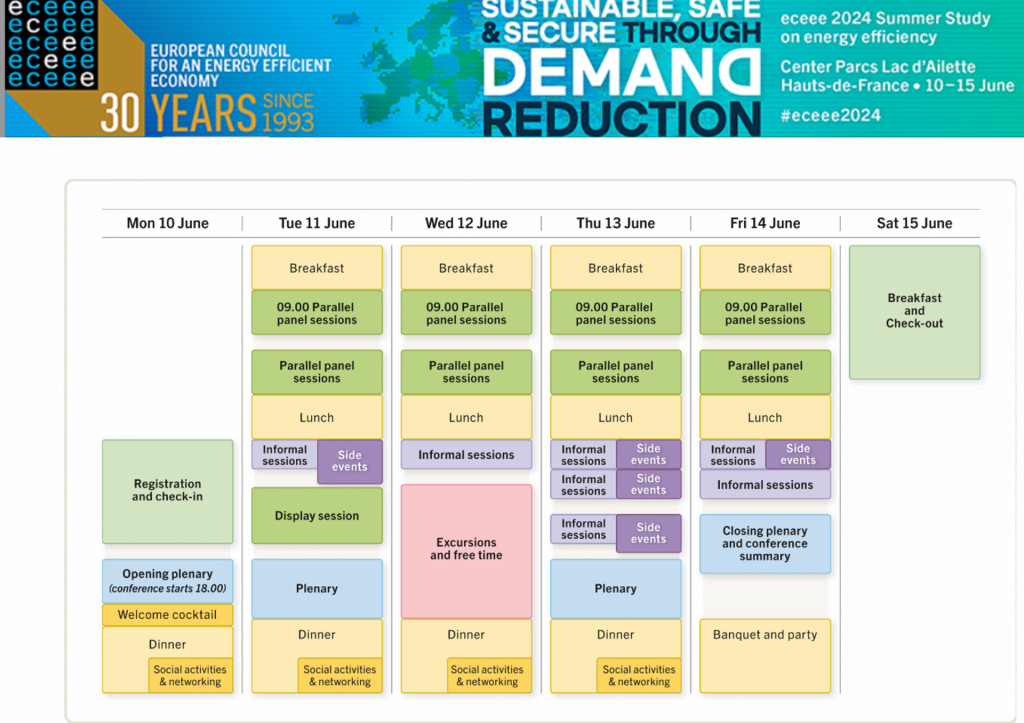
Meet our EU-MORE colleagues at eceee summer study next Tue & Thu
EU-MORE will display two posters at the poster session on Tue afternoon:
1) Assessing the Environmental Impacts of Policies on Industrial Electric Motors
A Stock Model, Material Flow Analysis and Life Cycle Assessment Approach
2) Policy recommendations to accelerate the replacement of old electric motors
plus, our colleagues from Fraunhofer ISI will also be involved in “informal sessions” on Thu on “EU Product Regulations: From Ecodesign to ESPR”

Series of first national EU-MORE stakeholder workshops in Greece, Belgium and Germany in May

Trends in motor technologies, and why old electric motors should be replaced faster – presented by the EU-MORE project at Coiltech trade-show & World Magnetic Conference end of March 2024
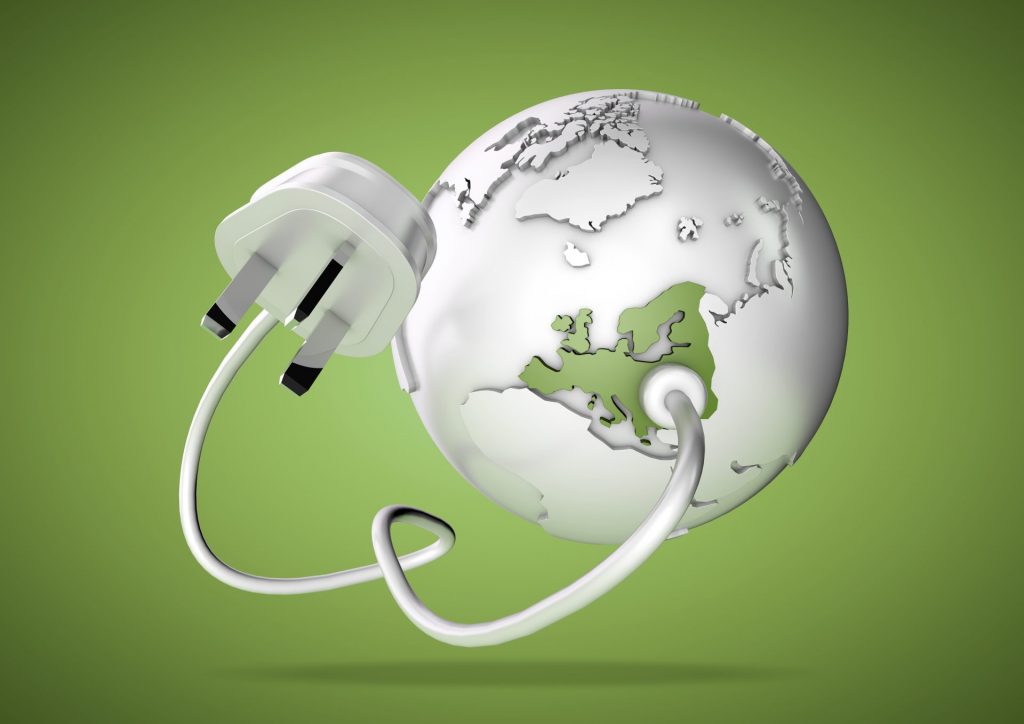
eceee: Energy efficiency could offer major climate wins. But what is it?
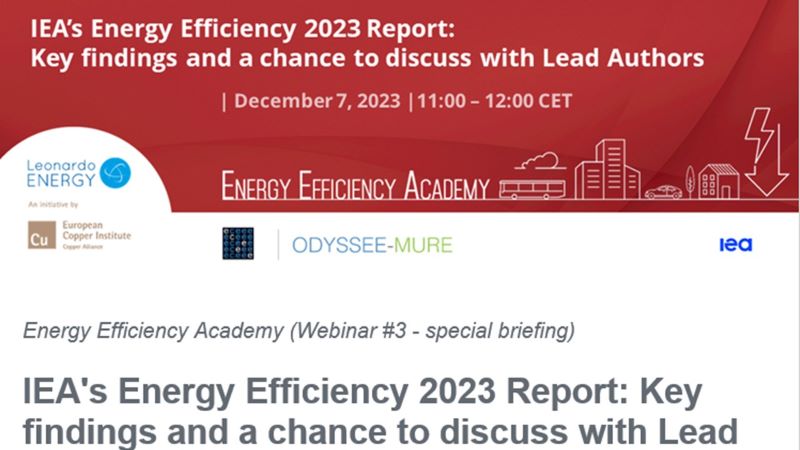
Webinar: IEA’s Energy Efficiency 2023 Report: Key findings and a chance to discuss with Lead AuthorsWebinar:
| IEA’s Energy Efficiency 2023 Report: Key findings and a chance to discuss with Lead Authors |
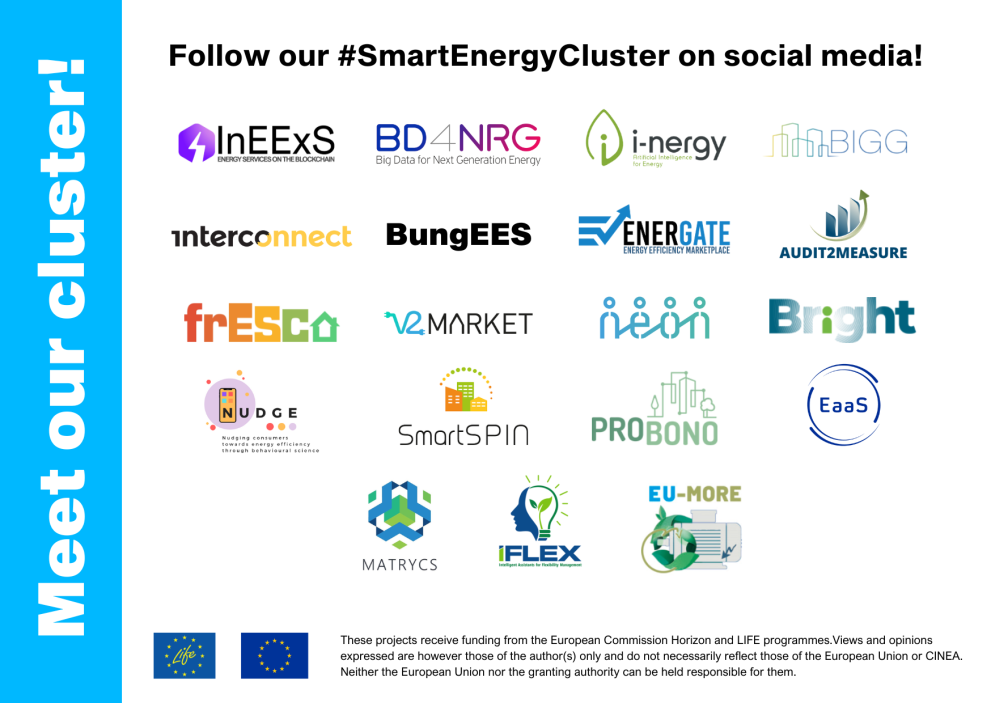
CINEA article promoting LIFE projects forming a new #SmartEnergyCluster aimed at achieving a sustainable and efficient energy system.
Unlocking the Power of Collaboration: The #SmartEnergyCluster Driving the Smart Energy Transition
Energy-saving blockchain technology, replacing outdated electric motors and integrating smart energy services are among the LIFE projects forming a new #SmartEnergyCluster aimed at achieving a sustainable and efficient energy system.
Energy-saving blockchain technology, replacing outdated electric motors and integrating smart energy services are among the LIFE projects forming a new #SmartEnergyCluster aimed at achieving a sustainable and efficient energy system.
Recognising that collaboration and innovation are key, 19 projects will pool resources and expertise to accelerate the smart energy transition. The projects share a common objective to develop and deploy new business models and concepts which add value by leveraging integrated energy services.
#SmartEnergyCluster projects focus on merging different energy services and incorporating non-energy benefits whilst overcoming market fragmentation and fostering cooperation. This inclusive approach bridges gaps and creates a common ground for business development across different segments.
The cluster also aims to communicate the projects’ activities and success stories to groups interested in smart energy solutions in order to amplify the impact of innovative service offerings, reduced energy costs for end-users, and faster payback periods for sustainable energy investments.
Among the innovative LIFE projects taking part in the #SmartEnergyCluster are:
- InEExS (Integrated Energy Efficiency Services), uses blockchain technology to tokenise energy-saving data and enable cooperation among sectors. It focuses on integrating smart energy services and sustainable technology while bringing together different market actors through distributed ledger technology. InEExS revolutionises energy efficiency by promoting system efficiency, non-energy benefits and seamless cooperation among stakeholders.
“The core of InEExS is the deployment, validation, and replication of integrated energy services,” says InEExS coordinator Filippos Anagnostopoulos, “It opens new possibilities and offers integrated service packages to enable energy savings, promote renovations, electrify heating and improve the efficiency of the energy system.”
- AUDIT-TO-MEASURE, which helps companies reduce energy consumption by translating energy audit opportunities into actionable measures, facilitating their energy transition. “AUDIT-TO-MEASURE helps companies take up the energy-saving measures recommended by energy audits,” explains project coordinator Simone Maggiore. “We are developing a capacity-building programme for decision makers and energy managers within the company, helping them to see the benefits of a more energy-efficient business and operation.”
- EU-MORE (Early Replacement of Old Electric Motors), is an innovative project to accelerate the replacement of outdated electric motors throughout the EU and give credit to Member States which are early adopters of energy-efficient equipment. By promoting sustainable practices and using modern technologies, EU-MORE contributes to the EU’s energy reduction targets through system efficiency and circular economy principles.
- BungEES (Bundling Energy Efficiency Services) – a comprehensive package of smart energy efficiency services which integrates energy sectors and innovative financing and offers rewards for adopting energy-efficient technologies.
The #SmartEnergyCluster highlights the power of collaboration to drive and is a great opportunity to showcase ground-breaking LIFE projects with significant potential for improved energy efficiency, increased renewable energy use and enhanced system flexibility.
The cluster aims to inspire even greater collaboration, innovation and more widespread adoption of smart energy solutions by everyone involved in the sector and to pave the way for a smarter, greener, and more efficient energy system for all.
Publication date: 7 July 2023
Author: European Climate, Infrastructure and Environment Executive Agency

IEA press release: Doubling global pace of energy efficiency progress by 2030 is key step in efforts to reach net zero emissions
As dozens of ministers and CEOs from around the world gather in France for IEA Global Conference on Energy Efficiency, new analysis sets out what’s needed to meet energy and climate goals.
he International Energy Agency is bringing together global energy and climate leaders in France this week for a major ministerial meeting on energy efficiency, with new IEA analysis showing that the world needs to double progress on efficiency between now and 2030 as part of efforts to improve energy security and affordability while keeping the goal of limiting global warming to 1.5 °C within reach.
The IEA’s 8th Annual Global Conference on Energy Efficiency is convening 700 people from more than 80 countries, including over 30 ministers and 50 CEOs, in Versailles to address how to accelerate energy efficiency improvements. The event is co-hosted by France’s Minister for Energy Transition Agnès Pannier-Runacher and IEA Executive Director Fatih Birol, and is being organised in partnership with Schneider Electric.
A special briefing report published today for the Global Conference – Energy Efficiency: The Decade for Action – highlights that ramping up annual energy efficiency progress from 2.2% today to over 4% annually by 2030 would deliver vital reductions in greenhouse gas emissions and at the same time create jobs, expand energy access, reduce energy bills, decrease air pollution, and diminish countries’ reliance on fossil fuel imports – among other social and economic benefits.
Energy efficiency investment in 2023 is expected to reach record levels, despite a slowdown in year-on-year growth as the high cost of capital weighs heavily on potential new projects. Under current expected and announced policies, efficiency-related investment is projected to rise by a further 50%. However, to see annual progress double, investments in the sector must increase from USD 600 billion today to over USD 1.8 trillion by 2030.
IEA Executive Director Fatih Birol said: “Today, we are seeing strong momentum behind energy efficiency. Countries representing over 70% of the world’s energy consumption have introduced new or improved efficiency policies since the global energy crisis began over a year ago. We now need to push into a higher gear and double energy efficiency progress by the end of this decade. I believe this major global conference, which I’m delighted to co-host with French Minister Pannier-Runacher, can be a vital impetus for accelerating ambition and action.”
France’s Minister for Energy Transition Agnès Pannier-Runacher said: “Energy savings and energy efficiency are the most simple and obvious responses to both the energy and the climate crises. They are one of the most crucial actions for clean energy transitions, and that is why I am honored to co-host this important global conference. I am pleased to be working closely with the International Energy Agency to strengthen the focus on energy efficiency worldwide.”
Chairman of Schneider Electric Jean-Pascal Tricoire said: “Optimizing how we consume energy is the priority of how we tackle the climate-and-energy crisis. We have all the ingredients. What we don’t have is time: We simply can’t let more time go by before we deploy the power of electrification and digital energy-efficiency technologies to the fullest.”
Policy will have a critical role to play in whether the world delivers on energy efficiency in the short, medium and long term. The RePowerEU plan in Europe, the Inflation Reduction Act in the United States and Japan’s Green Transformation (GX) initiative are a few examples of policy makers making renewed efforts to deliver on the energy efficiency agenda. While various emerging and developing economies – including India, Chile and South Africa – have enacted progressive measures to bring energy efficiency to the fore.
The new IEA report shows how doubling energy efficiency efforts can also deliver positive knock-on effects for society. Today, the sector employs tens of millions of people worldwide. With increased ambition, energy efficiency activities could lead to another 12 million jobs globally by 2030. Importantly, more efficient and lower energy demand supports faster progress towards universal access to modern and affordable energy in emerging and developing economies. The shift toward efficient electrification through the phasing out of the traditional burning of biomass such as charcoal and wood for heating and cooking also brings multiple benefits in terms of improved air quality and health.
To continue its support for stronger action on efficiency, the IEA has developed and updated its policy toolkit for governments. The toolkit comprises two parts: The first is 10 strategic principles, based on the recommendations of the Global Commission for Urgent Action on Energy Efficiency, that bring together key learnings from global experience on how to maximise the impact of all energy efficiency policies and programmes. The second is a set of sectoral policy packages that highlight key policies available to governments, and how they can be integrated into an effective coherent suite of policies and actions to deliver faster and stronger efficiency gains. The 2023 policy toolkit includes two new policy packages on clean cooking and finance as well as updates to the existing packages.

EU-MORE welcomes recast Energy Efficiency Directive
Accelerated motor replacement brings wide-ranging benefits
Brussels, May 2023: With the political agreement between the Council presidency and the European Parliament negotiators last month, the recast Energy Efficiency Directive (EED) is taking shape.
EU-MORE welcomes the fact that Member States can take full credit for policy measures aiming to accelerate the uptake of more efficient equipment. This is in line with the objectives of EU-MORE, a LIFE-Project aiming to speed up replacement of old, inefficient electric motors in industry and the service sector. Accelerating motor replacement in the EU will contribute an estimated 10% of the new final energy reduction target for 2030.
The political agreement – still provisional – sets the major target to reduce final energy consumption at EU level by 11.7% in 2030 compared to the forecasts for that year made in 2020, corresponding to a saving of around 1000 TWh. Member States will be obliged to shift up a gear in their energy savings obligation schemes if they are to contribute their share. In achieving this, they can take full credit for policy measures leading to older less energy efficient equipment being replaced by new and more efficient types before the usually expected renewal date. Under Annex V.2.k of the final compromise text, savings can accrue from the moment of replacement until the end of the average expected lifetime of the product replaced.
This paragraph in the EED, carried over from the 2018 edition, is likely to have huge positive implications for electric motors in industry and the service sector which currently tend to stay in service for 30 or 40 years. This is much longer than generally assumed and exceeds the figures used in Ecodesign regulation impact assessments. With swift action by Member States, this replacement rate could be improved, generating savings of 25 TWh per year in the EU, with all the associated benefits. This savings potential would be in addition to the current Ecodesign impact calculations, since these are based on motor sales figures before the effects of any accelerated replacement programme are taken into account.
Savings could be even greater if measures to address the efficiency of the entire motor system are put in place at the moment of replacement. Such measures include appropriate sizing of the motor, digitalisation, sensorisation, eliminating unnecessary transmission, and equipping motors with variable speed drives (VSDs). If entire systems are renovated, the additional savings potential could be as much as 73 – 133 TWh, or around 10% of the EU final energy reduction target for 2030.
Accelerating uptake makes even more sense because the new generation of efficient electric motors are manufactured from recyclable materials with high residual value, such as cast iron, electrical steel, plain carbon steel, aluminium, and copper. Recirculating these metals greatly reduces the emissions currently associated with producing primary metals, since recycling requires less energy than producing from virgin materials. This would ensure that programmes accelerating motor replacement are not at odds with the EU circular economy goals.

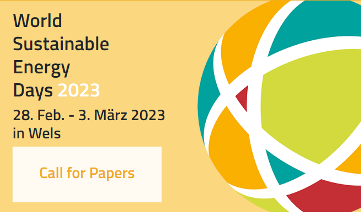
2023: Energy Transition = Energy security!
The price crisis, multiplying signs of climate change, and threats to energy security urge us to act like never before. REPowerEU reflects this urgency and provides new momentum for the energy transition.
In 2023, the World Sustainable Energy Days show the critical role of the energy transition in securing our clean energy future and concrete policies, technologies and markets to get us there. The annual conference is a leading event on the energy transition and climate neutrality with over 650 participants from over 60 countries.

Sustainable Industrial Manufacturing (SIM)
LEADING A CLEANER INDUSTRIAL FUTURE
Walk away informed and inspired about your company’s sustainability journey.
SIM Europe offers delegates a deep-dive into the latest solutions for sustainable manufacturing, break-through technology, and the future direction of industrial processes.

Lisbon Energy Summit & Exhibition
The Lisbon Energy Summit & Exhibition, endorsed by the Portuguese Ministry of Environment and Climate Action will take place in Portugal, a world leader in new energies and technological innovation.
The Lisbon Energy Summit is set to be Europe’s largest annual gathering focusing on balancing energy security and achieving net zero ambitions, the decarbonisation of existing energy systems and investing in new renewable energy sources.

ENERGY EFFICIENT INDUSTRIAL MOTORS
Electric motors are of utmost importance in industrial as well as agriculture sector. These motors found their application as constant speed drives with very low rating as well as variable speed drives with very high rating. This paper describes the various factors affecting the efficiency of motor and method to increase it on the basis of comparison with various standards. An incremental difference in the efficiency is also discussed.

6 countries join forces to help companies “get things done” saving energy
The European-funded project AUDIT2MEASURE will support companies in turning energy audits into actionable plans. For the next 3 years, 10 partners from 6 countries will focus on taking down barriers to the uptake of Energy Saving Measures (ESM), thus accelerating their response to the present energy context.
Energy prices reach new heights across Europe and fears for gas shortages lead to the roll-out of emergency plans and measures that affect citizens, companies, and governments at all levels. The growing push towards the energy transition prompted a spread of energy audits – which have shown to be a proven tool to tell companies where to start their interventions for better energy efficiency -, however, studies show these audits seldom result in actions, with informational, behavioural, and/or economic barriers being coined as culprits. Industry continues, therefore, to be a key player in energy consumption with high economic impact in the European Union (EU).
Looking to change this trend of collective inertia, 10 partners from 6 European countries (The Czech Republic, Germany, Greece, Italy, The Netherlands, and Spain) are working on a project that aims to motivate companies to act by addressing common barriers and offering practical support.
Speeding up energy transition, multiple barriers at a time
Three main barriers may block the adoption of Energy Saving Measures in the industrial sector: lack of information (about the costs and benefits; about energy contracts; about the potential impact on the business); behavioural inertia (due to lack of interest or commitment; imperfect evaluation criteria); and economic discouragement (low capital availability; intervention-related risks; insufficient profit potential). AUDIT2MEASURE will address each by engaging stakeholders through a holistic approach which focuses on clarifying the auditing process and resorting to using success cases as replicable examples.
AUDIT2MEASURE starts from an engagement principle called “Audit2Action”, which draws opportunities from audits and turns them into real plans of action. Among the expected project outcomes is a direct, hands-on, capacity building programme designed to engage professionals of all seniority levels, in- and outside the decision-making flow. This programme will advocate for the benefits of implementing at least 125 measures in different industrial fields, thus encouraging the execution of action plans after every energy audit.
As much as 60 companies will be engaged in AUDIT2MEASURE, invited to share experiences with energy audits and their implementation through a common Knowledge Exchange Space to help motivate others and allow for strategic comparison and replication. Through this combined approach, AUDIT2MEASURE is expected to increase the implementation rate of ESMs following auditing processes, thus nudging the industrial sector towards a green transition.
Different industrial sectors on board
For the sake of relevance and representativity, AUDIT2MEASURE will address different industrial sectors in each country:
- In The Czech Republic, the main sectors addressed include non-metallic mineral (glass, construction products), chemical industry, iron, steel, and automotive;
- In The Netherlands, the machining sector is targeted specifically for its energy intensity and savings potential. It is one of the nation’s most profitable industries which have already shown their willingness and openness to explore the implementation of ESM;
- In Italy, the ceramic, chemical, pharmaceutical, plastic, and machinery sectors will be addressed, as they rank top for consumption and potential energy savings;
- In Spain, the non-metallic mineral, chemical-pharmaceutical, machinery, and pulp and paper sectors will be targeted mainly because their energy efficiency potential is high, and also because the amount of these industries in the country is very representative;
- In Greece, the machinery sector will be mainly targeted due to its energy intensity and savings potential, as well as the numerous companies activated in the field and the replication dynamic (production of aluminum and iron constructions, production of agricultural machinery companies and companies activated in the manufacturing of electrical equipment, among others).
For more information on the project, visit www.ieecp.org

Co-funded by the European Union under project ID 101075785. Views and opinions expressed are however those of the author(s) only and do not necessarily reflect those of the European Union or CINEA. Neither the European Union nor the granting authority can be held responsible for them.
CONTACT PERSON
Marta Maia
marta@ieecp.org
+351 916 165 442
PARTNERS


ENERGY-EFFICIENT ELECTRIC MOTORS AND MOTOR SYSTEM
Improving energy efficiency is the fastest, cheapest and cleanest way to get reliable power to more people. Well over half of the world’s electricity is consumed
by just four products: electric motor systems, lighting, room air conditioners, and residential refrigerators.

CRES Press Release Dec 2022
Greek Minister of Environment and Energy, Kostas Skrekas claimed
“With 200 million euros we are upgrading the energy efficiency of small and medium enterprises, the backbone of our national economy”
In Greece, the Minister of Environment and Energy, Kostas Skrekas, presented the new “Save – Business” Program, with a budget amounting to 200 million euros. The program aims to improve the energy efficiency of small and medium enterprises, and foresees among other eligible actions the upgrade of electromechanical equipment. As a minimum the program requires each project to achieve 35% reduction in energy consumption and CO2 emissions. The program as a whole is expected to contribute to the national energy efficiency targets, by reducing primary energy consumption by 380 GWh annually.
Link to full press release (Greek language only): https://ypen.gov.gr/kostas-skrekas-me-200-ekat-evro-anavathmizoume-tin-energeiaki-apodosi-mikromesaion-epicheiriseon-tis-rachokokalias-tis-ethnikis-mas-oikonomias/
Source: CRES, Dec 2022
